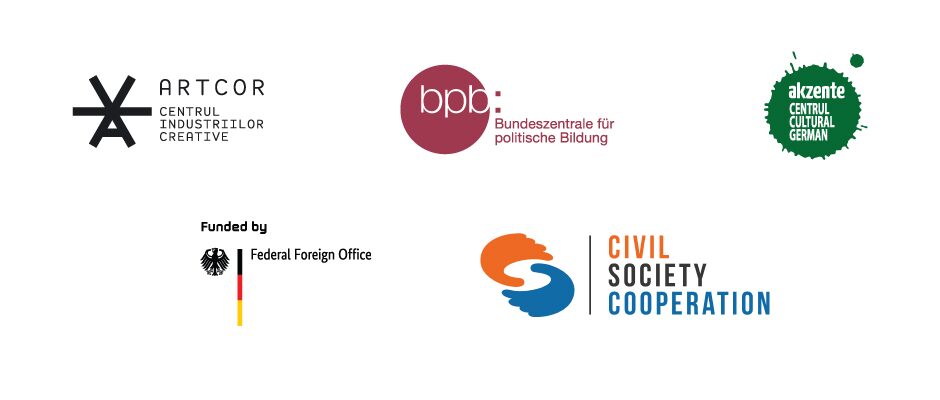LGBT+ in Georgia: Applying for “Gayropa” membership
This article was produced in the framework of the "Unprejudiced" project with the support of the Eastern Partnership Programme and the German Federal Foreign Office in August 2022.
Authors:
Tobias Wurzel
Ani Arveladze
While the broad majority of the Georgian population is in favour of an EU membership, recent attacks against the LGBT+ movement with the consequence of Tbilisi Pride March 2021 being cancelled overshadow such aspirations. The risks of organising another March for Dignity in 2022 were too high as radical groups continue to threaten queer activists. But the lack of international media coverage this summer seems to question if Georgian homophobia is still relevant to the European public.
 Violent groups break into the office of Tbilisi Pride on 5th of July 2021 © Ani Arveladze
The violent attacks on journalists during Tbilisi Pride 2021 created a lot of attention from international political institutions, non-governmental organisations (NGOs) and the media focussing on the human rights standards in Georgia. Even in times of crisis, when the Associated Trio (Georgia, Moldova and Ukraine) hastens to prepone their application to become a member of the European Union (EU) in consequence of Russia’s war in Ukraine – Georgia initially planned to apply in 2024 – at least the EU seems to stay aware of the violation of human rights: In June 2022 the European Commission (EC) published a demanding statement regarding Georgia’s application from March 2022 to become a member of the EU while Moldova and Ukraine already received the EU candidate country status by the European Council on basis of the EC recommendation. It is now up to Georgia to show that it shares certain values with the EU in order to follow its Trio Associates into the EU candidate process.
Violent groups break into the office of Tbilisi Pride on 5th of July 2021 © Ani Arveladze
The violent attacks on journalists during Tbilisi Pride 2021 created a lot of attention from international political institutions, non-governmental organisations (NGOs) and the media focussing on the human rights standards in Georgia. Even in times of crisis, when the Associated Trio (Georgia, Moldova and Ukraine) hastens to prepone their application to become a member of the European Union (EU) in consequence of Russia’s war in Ukraine – Georgia initially planned to apply in 2024 – at least the EU seems to stay aware of the violation of human rights: In June 2022 the European Commission (EC) published a demanding statement regarding Georgia’s application from March 2022 to become a member of the EU while Moldova and Ukraine already received the EU candidate country status by the European Council on basis of the EC recommendation. It is now up to Georgia to show that it shares certain values with the EU in order to follow its Trio Associates into the EU candidate process.Homophobia: 75 % of the Georgian society are against gay marriage
These values differ severely with respect to the human rights standards especially concerning the LGBT+ equality: In a recent study published by Women’s Initiative Supporting Group (WISG) in 2022, almost 75 % of the Georgian society still oppose gay marriage. More drastically, the share of respondents agreeing with the thesis that “most gay men are paedophiles” (28.8%) has even increased compared to a similar 2016 study. “This has always been the narrative in Georgian politics and some social circles: LGBT+ people can do whatever they want but in their bedrooms, and they are okay unless they show up in public spaces”, says Tamaz Sozashvili, cofounder of Tbilisi Pride and LGBT+ activist. “Basically this is what happened this year: It was not completely public and it was not completely closed in secret events”. Even though Tbilisi Pride announced all three events within Pride week 2022 (movie premiere, regional conference, Pride festival) publically, they did not organise another Pride March after what happened last year.
“If the government is not capable of managing 5.000 people what kind of government is that?” (Tamaz Sozashvili, Tbilisi Pride)
“The violent attacks in 2021 were orchestrated and the government did not only fail to stop it, but they encouraged it”, says Tamaz Sozashvili. Radical groups were threatening to destroy the Tbilisi Pride office in advance and it was public news: “The government was parading this information during the security negotiations”. According to the LGBT+ activist they had been informed about 30.000 later even 50.000 people organising violence against Tbilisi Pride. “But in reality we saw a maximum of 5.000 people who showed up in the streets on 5th of July 2021. If the government is not capable of managing 5.000 people what kind of government is that?” While the whole country was watching it live on TV, antigay radicals climbed up to the third floor on the balcony to enter the office of Tbilisi Pride. “There was only a single policeman watching”, says Tamaz Sozashvili. “They could have brought cars full of cops to prevent these attacks, but they did not do anything”. The fact that homophobia is such an issue in Georgia and that it can be mobilised so effectively is due to the political class according to Dr Sonja
Katharina Schiffers, Head of South Caucasus Regional Office (Heinrich Boell Foundation): “Some politicians are not afraid of using homophobia to do politics. If there was a greater sense of responsibility, homophobia would also be less prevalent“.
“Last year Georgia’s prime minister made this statement, which was the green light for the violent groups to do whatever they did against Tbilisi Pride”, says Tamaz Sozashvili, co-founder of Tbilisi Pride. “He said basically a few minutes before that when the majority of Georgian society does not want something to happen, it should not be happening and he was talking about Pride March”. He said that people were aggressive and this was the reason of his announcement. The Pride March is called “March for Dignity” in Georgia, but the Georgian prime minister Irakli Garibashvili called it a “March of Provocation” according to Tamaz Sozashvili as LGBT+ people would want civil unrest in the country – “This is complete nonsense”. Leaders of the Georgian Dream party that forms the government often associate Tbilisi Pride organisers with the political opposition. According to the cofounder of Tbilisi Pride the only goal of this narrative would be to delegitimise their activism and to encourage homophobic hatred: “We haven’t had any connection with a political party and just want to support LGBT+ rights in Georgia.”
Hundreds of LGBT+ activists leave Georgia because they don’t feel safe
Even though homophobia is ranked high in Georgia there are several NGOs in Tbilisi fighting for equality like Equality Movement, Temida or Women’s Initiatives Supporting Group (WISG). But the LGBT+ community in Georgia is divided and according to Dr Sonja Katharina Schiffers these partner organisations are not supporting the Tbilisi Pride: "As long as the state is not ready to fully protect LGBT+ persons the visibility approach has certain risks in Georgia. When teenagers come out, for example, they can very easily end up on the streets and there are not the appropriate reception structures“. In a Joint Statement published in May 2022, the LGBT+ organisations criticised the current Pride movement and the “socio-economic and political oppression”. After experiencing violence, a lot of LGBT+ people including activists were emigrating to the European Union and try to seek asylum – leaving behind those who can't or don't want to go. Tbilisi Pride cofounder Tamaz Sozashvili left for a Master scholarship from a Swedish institute, but he would have stayed without this coincidence.
 Violent groups at Tbilisi Pride 2021 © Tabula
Tamaz Sozashvili is still involved in Georgian LGBT+ activism through the online magazine queer.ge, which he founded with another activist in 2021 and which allows him to continue his work from abroad. “I enjoy what I have been doing for the community and the country. But I really needed some break because it was very intense and it would have been quite difficult to continue living in this society”. On 5th of July the Tbilisi Pride organisers were followed by radical groups and had to change their location several times. “State security service was providing all the information to them where we were”, says Tamaz Sozashvili. “I don’t know what would have happened. We saw how they beat up journalists and they might have killed us”. The cofounder of Tbilisi Pride already received death threats since 2019, but he has never been physically attacked which he calls a “miracle” because the threats coming from these radical groups are very real. Cameraman Lekso Lashkarava who met with Tbilisi Pride organisers for
Violent groups at Tbilisi Pride 2021 © Tabula
Tamaz Sozashvili is still involved in Georgian LGBT+ activism through the online magazine queer.ge, which he founded with another activist in 2021 and which allows him to continue his work from abroad. “I enjoy what I have been doing for the community and the country. But I really needed some break because it was very intense and it would have been quite difficult to continue living in this society”. On 5th of July the Tbilisi Pride organisers were followed by radical groups and had to change their location several times. “State security service was providing all the information to them where we were”, says Tamaz Sozashvili. “I don’t know what would have happened. We saw how they beat up journalists and they might have killed us”. The cofounder of Tbilisi Pride already received death threats since 2019, but he has never been physically attacked which he calls a “miracle” because the threats coming from these radical groups are very real. Cameraman Lekso Lashkarava who met with Tbilisi Pride organisers foran interview that morning died after the attacks in 2021. “It was very hard and it’s still very hard to remember”, says Tamaz Sozashvili. “The radical groups came to that place because of us. They didn’t find us, but they found the journalist and we could have easily been in his place – any of us.”
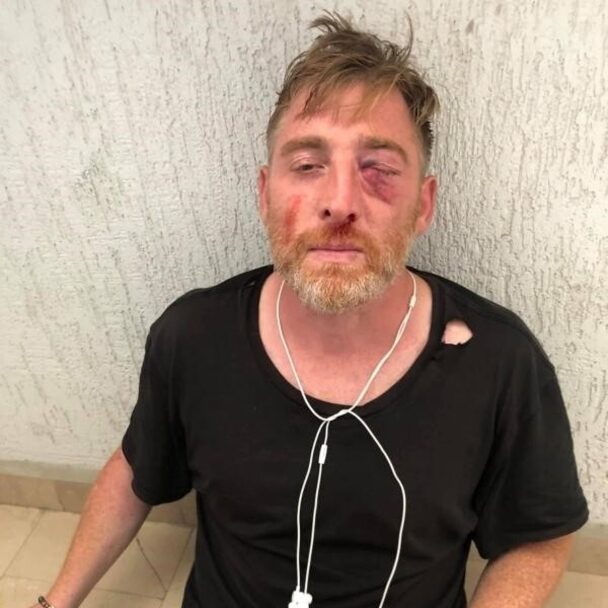 Journalist Lekso Lashakarava after the violent attacks at Tbilisi Pride 2021 © Lashakarava
Journalist Lekso Lashakarava after the violent attacks at Tbilisi Pride 2021 © Lashakarava
Aggressive antigay groups blocked Rustaveli Avenue in Tbilisi before any participants of the March for Dignity could appear, so they started to beat journalists. Dozens of journalists were hurt. Giorgi (37) was one of the photographers who were on Rustaveli Avenue: “I was doing my job, when I saw people were running after my colleague: They were hitting him and I was taking a picture when suddenly somebody hit me on my head”, says Giorgi. “I lost my consciousness. When I woke up, I was in a hospital”. The photographer describes Tbilisi Pride March 2021 as one of the most horrible days for journalists in Georgia. There were not enough policemen to protect the journalists or LGBT+ activists who were hiding in buildings nearby. Violent attacks against the LGBT+ community had started to accumulate since May 2013 and they have been supported by the Georgian Orthodox Church, radical groups and politicians. The main groups that protested against Tbilisi Pride in 2013 were priests and people who called themselves protectors of the Georgian culture and traditions.
“Some may think I’m weak, but Pride 2013 was the day when I quit being Georgian” (Nia (27), LGBT+ activist in exile)
LGBT+ activist Nia (27) was there when these first brutal event happened at Freedom Square in 2013: “Imagine, I was only 18 when this happened. The next day I had my prom and the 17th of May was such an important day for me, because it was the first time in my life, when I decided to say out loud that I’m gay“. After finishing school Nia decided to move to the United States of America (USA). “All of us who were there decided to leave Georgia”. In her perspective Georgia is a place where the government doesn’t protect its people and the church is punishing them, because they think they are sinners. “And why? Because I love another person? Is it a sin? What kind of religion tells people to hit others with a chair and kill them?” After a few years of study, Nia returned to Tbilisi because of her younger sister. She wants to take her with her to the USA. “Some of you may think that I’m weak because I ran”, says Nia in regard of the people who stayed in Georgia and continue to fight. “But for me Pride 2013 was the day when I quit being Georgian. I’ll be the happiest person, if someday gay people will live a free life in Georgia. But I think it is way too far in the future “.
International activists support Tbilisi Pride with campaigns
After the events happened in 2013, LGBT+ activists had different kinds of protests through the years: They were making banners and flash mobs with the main message “We are all equals”. But they never tried to appear in the streets of Tbilisi for a Pride until 2019. That was when Tbilisi Pride decided to organise the first Pride March in Georgia. One of the international partners that have followed and supported Tbilisi Pride from the start is the All Out Movement. All Out offered its support and started a campaign to ask Georgian authorities to keep Tbilisi Pride 2019 safe protecting the freedom of assembly in Georgia and therefore protecting Pride attendees. The Georgian All Out campaign was a petition to local administrations as it is the usual procedure at All Out and already helped organise numerous Prides worldwide and it was translated into five languages; that is to say the 28.000 signatures of the petition came from all over the world.
“There were streets filled with NATO flags and EU flags which was very inspiring for me.” (Yuri Guaiana, All Out Movement)
“I started working for the 2019 campaign because I read in the news that Tbilisi Pride was threatened and there were many problems“, says Yuri Guaiana, campaign manager of the 2019 petition (All Out). So he reached out to Tbilisi Pride and asked whether they needed support from the international community. „They said yes and they specifically also said that it was important that somebody came to Tbilisi for supporting the Pride as international guests”. So All Out did both: They delivered the
signatures of the petition to the office of Georgia's prime minister and supported the Pride in Tbilisi. Unfortunately, Yuri Guaiana could not stay for the actual Pride March due to the fact that it was postponed. “But during the events I attended I felt secure. There were streets filled with NATO flags and EU flags which was very inspiring for me. It doesn’t happen in Italy and many other countries”.
In 2019, when Tbilisi Pride decided to organise the first Pride March in Georgia, All Out offered its support: All Out started a campaign to ask Georgian authorities to keep Tbilisi Pride 2019 safe protecting the freedom of assembly in Georgia and therefore protect Pride attendees. The All Out petition with 28.000 signatures was personally delivered to the office of the Georgian Prime Minister during pride week 2019.
In 2021, All Out promoted another campaign organised by Tbilisi Pride on the All Out website with international support: It was a petition to ask for an investigation on the death of the journalist Lekso Lashakarava and the violence against Tbilisi Pride 2021. The campaign is still open.
In 2022, All Out and Milan Pride (Italy) organised events to showcase the situation in the South Caucasus region and to discuss, how Russian imperialism impacts both people in Russia and outside of Russia. These events were held during Tbilisi Pride 2022 and one of the founders of Tbilisi Pride, Giorgi Tabagari, went to Milan to attend these events on an invitation of All Out and Milan Pride.
According to a recent study published by Carnegie Europe in cooperation with the Levan Mikeladze Foundation, 78 % of the Georgian population support joining the European Union. So how could this very strong Georgian homophobia possibly match such high EU aspirations? – Homophobia is widespread in Georgia and has been ingrained in people's minds for generations during the Soviet era. “Georgia was one of the countries in the Soviet Union that fought the hardest for its cultural independence. After the collapse of the Soviet Union, they turned towards Europe in the 1990s by joining the Council of Europe”, says Dr Sonja Katharina Schiffers (Heinrich Boell Foundation). From 2003 on, Georgia started a very strong “Euro-Atlantic orientation”, which, however, did not go into detail on all issues: “Unfortunately, it is easier to generate resistance among the Georgian population rather than support for the EU with the argument: The EU also stands for minority rights.”
International support is limited without a strong civil society
One of the international organisations that fights the hardest for human rights and the rights of minorities like the LGBT+ community is Amnesty International. On request, Judith Hoffmann, volunteer and South Caucasus coordinator in Germany stated: “There has been little contact with the Georgian government in recent years – not in form of actions and campaigns”. International campaigns and actions are coordinated by the Amnesty International Secretariat in London, United Kingdom. The International Secretariat also publishes the annual Amnesty Reports – like the 2021 Report on Georgia. Amnesty has no capacity to monitor and influence the situation on the ground: “Amnesty International currently limits its activities in Georgia to observation and individual statements, for example when the right to demonstrate is attacked or when there is disproportionate violence, as it happened last year”.
“It is not unusual that the LGBT+ movement will take struggle.” (Dr. Sonja Katharina Schiffers, Heinrich Boell Foundation)
Eventually the possibilities of international governments and institutions to influence and support the LGBT+ movement in Georgia are limited. In advance of Tbilisi Pride 2022, Germany has repeatedly put pressure on the Georgian government to ensure that the authorities protect Pride activities. But this is not an issue the German government would take action on at the highest level, but rather the German Embassy in Tbilisi. “Through international pressure, progress can be made on paper, which is important
because it gives local activists the opportunity to push for implementation. But that is not enough for protection”, says Dr Sonja Katharina Schiffers (Heinrich Boell Foundation). The civil society and activists in Georgia would have to do the lion's share of the work: “This process will certainly take decades, just as it has and still does in Germany. Therefore it is not unusual that it will take struggle”.
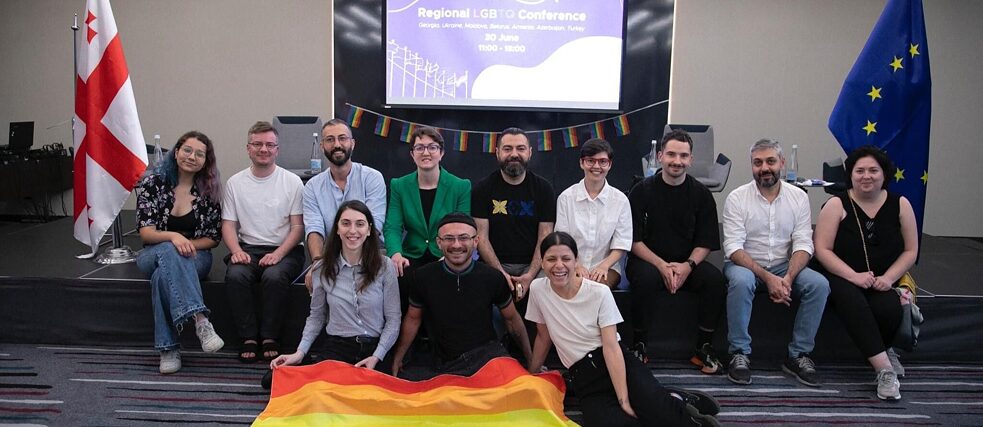 Regional Conference at Tbilisi Pride 2022 © Sozashvili
A struggle that Tamaz Sozashvili can relate to: Neither the police nor any government officials had contacted him for an official questioning to start investigating on the violent attacks. “Those people were threatening me, chasing me and destroyed basically everything in the Tbilisi Pride office, an office I created with my friends and colleagues”, says the activist. “It was like a home, so they broke into my home and there is no justice: I feel as if nothing really happened to me, even though it significantly affected at least my mental health”. This is why he and his colleagues applied to the European Court of Human Rights which now opened a legal case. The Court already called the events “unprecedented” and imposed the Georgian government to pay 194.000 Euros for the damage to the LGBT+ society. There is also an LGBT+ Intergroup, composed of Members of the European Parliament (MEPs). In a letter signed by multiple MEPs addressed to Georgian authorities the Intergroup called on concrete measures to ensure that no Pride participants were put in a situation of potential harm – which of course did happen. “The degree of influence of these initiatives is of course limited and we are aware”, says a Political Advisor at the European Parliament. “However, they do send a political message which in some occasions is taken into consideration and reflected upon by national authorities to take action”.
Regional Conference at Tbilisi Pride 2022 © Sozashvili
A struggle that Tamaz Sozashvili can relate to: Neither the police nor any government officials had contacted him for an official questioning to start investigating on the violent attacks. “Those people were threatening me, chasing me and destroyed basically everything in the Tbilisi Pride office, an office I created with my friends and colleagues”, says the activist. “It was like a home, so they broke into my home and there is no justice: I feel as if nothing really happened to me, even though it significantly affected at least my mental health”. This is why he and his colleagues applied to the European Court of Human Rights which now opened a legal case. The Court already called the events “unprecedented” and imposed the Georgian government to pay 194.000 Euros for the damage to the LGBT+ society. There is also an LGBT+ Intergroup, composed of Members of the European Parliament (MEPs). In a letter signed by multiple MEPs addressed to Georgian authorities the Intergroup called on concrete measures to ensure that no Pride participants were put in a situation of potential harm – which of course did happen. “The degree of influence of these initiatives is of course limited and we are aware”, says a Political Advisor at the European Parliament. “However, they do send a political message which in some occasions is taken into consideration and reflected upon by national authorities to take action”.No chance for Tbilisi Pride March without significant political change
Even though Tbilisi Pride 2022 was peaceful and succeeded without any violence, it doesn’t mean that the situation of the LGBT+ community improved “It’s the other way around: Not being able to hold a Pride March due to the previous violent attacks is a very clear message not only to the Georgian society but also to the international community that the LGBT+ rights are worsening in Georgia”. This time Tbilisi Pride organisers made the conscious decision not to announce and try to organise a Pride March because of the government’s statement and decision to cancel the Pride March in 2021. Theoretically the Georgian government cannot forbid a Pride March due to the freedom of assembly and freedom of expression. “But practically whenever we start negotiations with the government for the security details, they put a lot of pressure on us and try to make us cancel the event”, says Tamaz Sozashvili. “Unless government changes there is no chance of holding a Pride March out in the streets”.
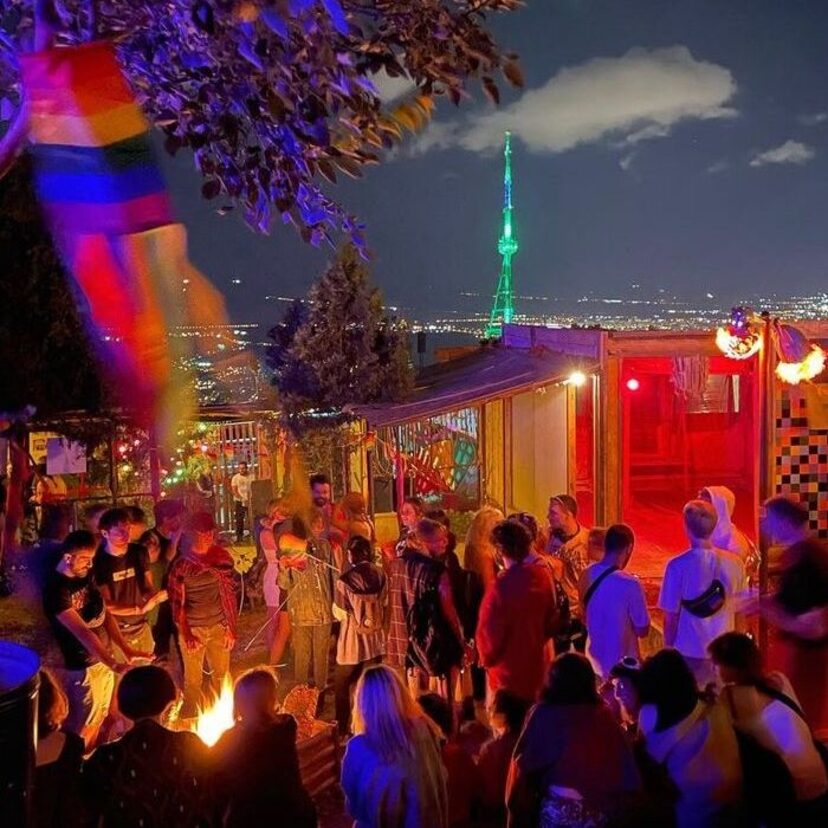 During the events of Tbilisi Pride 2022 no violent incidents occurred © Instagram
But there is hope that change will come. “Even just trying to become an EU member definitely will create the need for the government and Georgian authorities to show that Georgia shares certain values“, says All Out campaign manager Yuri Guaiana. That would certainly be something that could be used by LGBT+ activists for their work. Dr Sonja Katharina Schiffers agrees: “The more the population is in touch with freedom-oriented people and cultures, the less the tolerance of sexual minorities will be perceived as a threat”. According to the Political Advisor at the European Parliament, an approach to the EU has shown to be extremely positive in many cases. He refers to the EU anti-discrimination legislation which is part of the set of laws in Georgia: "We have recently seen many positive changes in other countries. However, the very membership of Georgia to the European Convention on Human Rights suffices in this case". German foreign broadcaster Deutsche Welle comments more drastically on recent demonstrations in favour of a Western course: “There is currently no clear link between rapprochement with the EU and the development of a diverse society with legal guarantees”.
During the events of Tbilisi Pride 2022 no violent incidents occurred © Instagram
But there is hope that change will come. “Even just trying to become an EU member definitely will create the need for the government and Georgian authorities to show that Georgia shares certain values“, says All Out campaign manager Yuri Guaiana. That would certainly be something that could be used by LGBT+ activists for their work. Dr Sonja Katharina Schiffers agrees: “The more the population is in touch with freedom-oriented people and cultures, the less the tolerance of sexual minorities will be perceived as a threat”. According to the Political Advisor at the European Parliament, an approach to the EU has shown to be extremely positive in many cases. He refers to the EU anti-discrimination legislation which is part of the set of laws in Georgia: "We have recently seen many positive changes in other countries. However, the very membership of Georgia to the European Convention on Human Rights suffices in this case". German foreign broadcaster Deutsche Welle comments more drastically on recent demonstrations in favour of a Western course: “There is currently no clear link between rapprochement with the EU and the development of a diverse society with legal guarantees”.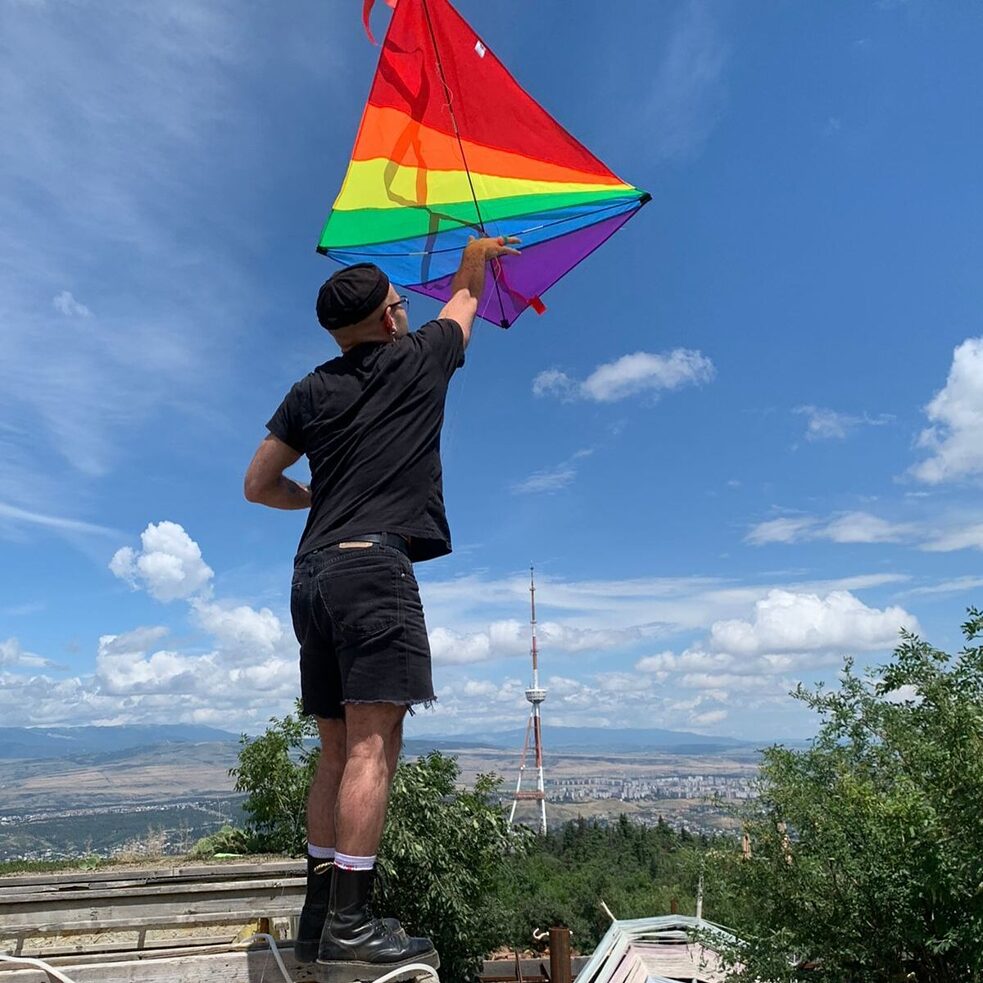 Tamaz Sozashvili returned to Georgia for the Tbilisi Pride Festival 2022 © Sozashvili
Tamaz Sozashvili returned to Georgia for the Tbilisi Pride Festival 2022 © Sozashvili
However, there is one positive outcome of the violent attacks: The awareness of homophobia within the Georgian society has been increasing significantly. “More and more people support the protection of LGBT+ rights”, says Tamaz Sozashvili. “We saw lots of comments and public discussions saying that
maybe they don’t like LGBT+ people, but this kind of violence against human beings is not acceptable in any way”. Eventually these violent groups are not only threatening the LGBT+ community in Georgia but also any other groups or individuals who do not fit into their boxes. So LGBT+ activists and the civil society in Georgia will have to continue their fight for equality with support of international institutions and public awareness by making use of the unique circumstances of the EU application process. This is going to be a tightrope act, as they have to follow their precarious course without endangering any members of the LGBT+ community, journalists or other allies.
Disclaimer: The interviews with Dr Sonja Katharina Schiffers (Heinrich Boell Foundation), Stana Iliev (All Out Movement) and Judith Hoffmann (Amnesty International) as well as the statements of Deutsche Welle (DW) have been conducted (and partly authorised) in German language. The authors of this text are responsible for any potential modifications due to the translation process.
